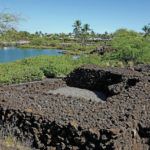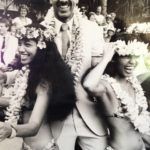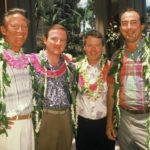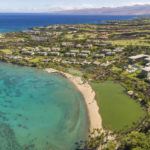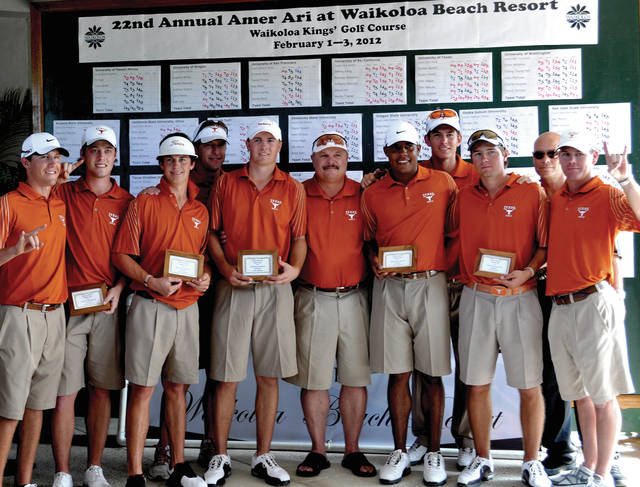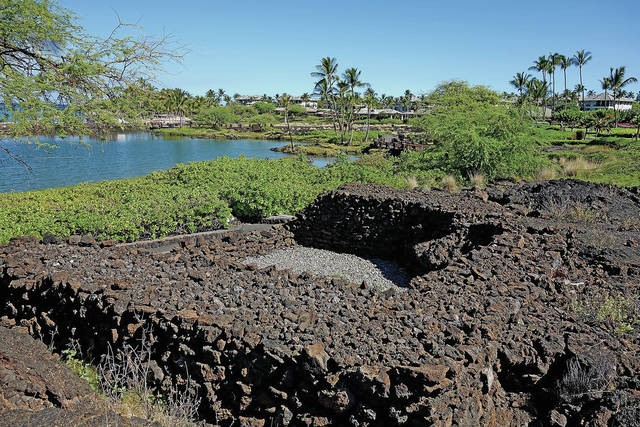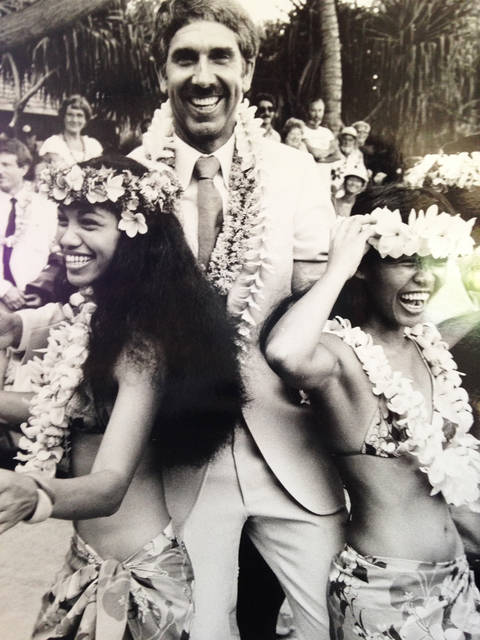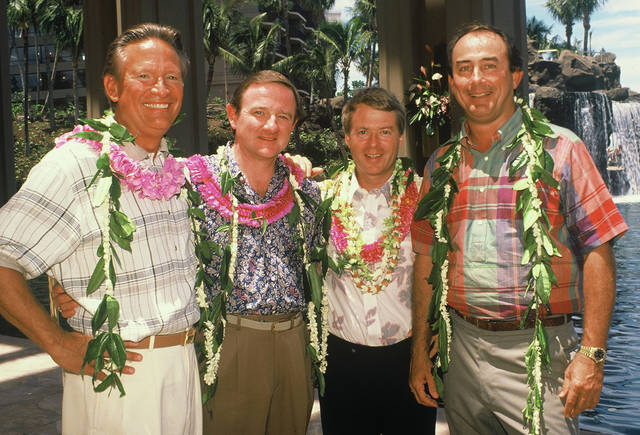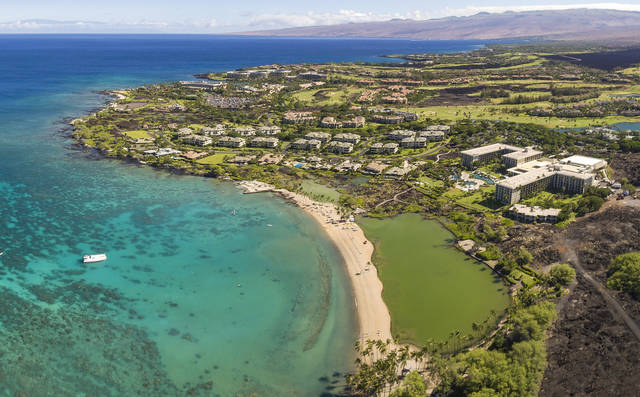WAIKOLOA — There are remnants of a once-thriving Hawaiian village next to the fishponds fronting Anaehoomalu Bay that date well before Captain James Cook’s arrival in 1778.
Today, the area is preserved as part of Waikoloa Beach Resort. Its fascinating transformation from lava to luxury is documented in a new coffee table book titled “The Gathering Place of the Kohala Coast,” recently published for Waikoloa by Flagship Custom Publishing.
“Recognizing that history is often lost to time, the partners at Waikoloa decided to publish a book to capture the story of the resort, relying on the memories of people who are still around to tell it,” George Fuller said, the book’s publisher and primary author.
Fuller, who lives in Waimea, added, “Luckily, there were many people, photos and old documents available from the earliest stages of planning and development to accurately inform the narrative.”
Scott Head, vice president of resort operations for Waikoloa Land Company, and Margo Mau Bunnell, sales and marketing manager, were both fully on board with the project.
“This was an important book for us in several ways,” Head said. “First, we have such a great story to tell about Hawaii’s people and culture, and how Waikoloa fits into that. Second, with the resort’s rise in prominence and popularity throughout the islands and the globe, it was time to chronicle the project’s past and evolution including the visionaries who made it a reality.”
In a readable and relatable writing style and format, the book tells of the many happenings at Waikoloa over the years, from the origins of Waikoloa Village to the grand opening of the Hyatt Regency (now the Hilton Waikoloa Village) in 1988 with a ceremony that was attended by a veritable “Who’s Who of Hawaii” along with celebrities including Dionne Warwick and Burt Bacharach who performed at the event.
At a cost of $360 million, the Hyatt was reportedly the most expensive hotel ever built at the time, and changed the way resorts would be built not only in Hawaii but around the world.
Featured guest, author James Michener, wrote of the event, “It’s the kind of place God would have built if he had sufficient cash flow.”
In the book, Fuller credits the developers and operators behind Waikoloa Beach Resort for their vision, imagination and determination to make the resort the economic engine it is today. Among those profiled are Ron Boeddeker, Thos Rohr and Chris Hemmeter.
Boeddeker showed extreme faith in the project after his employer, Boise Cascade Corporation, decided to divest itself of the property in 1974. The Idaho corporation had purchased 25,500 acres of land from Richard Smart and Parker Ranch in 1967.
Boeddeker was given the task of liquidating Boise Cascade’s assets, which he did, but he so believed in Waikoloa that he left his executive manager position and formed his own company, Transcontinental Corporation, to purchase and develop some of the land himself.
Doing so was extremely courageous, Fuller noted, because at the time Waikoloa consisted of little more than vast lava fields as far as the eye could see. Even Boeddeker’s wife, Kitty, was skeptical. In the book, the Boeddeker’s daughter, Cary Krukowski, recalls her mother’s reaction when he first took her to see the property.
“‘Look at this land,” Boeddeker said. “Can’t you see golf courses and hotels?”
“My mom looked around and said, ‘Are you insane?’” Cary recalled. “All she could see was black lava and a beautiful ocean.”
A legacy left by Boeddeker, and one of the things that makes Waikoloa unique still today, is the resort’s continued support of the local community and Hawaiian culture. The music, dance, arts and crafts of Hawaii are celebrated year-round throughout the resort.
“That directive came early on from Boeddeker,” Head said. “Everything we do at Waikoloa Beach Resort is geared toward both enhancing the guest experience and supporting the local community.”
Thos Rohr, well known for his work developing properties throughout Hawaii, was also quite influential in the development of Waikoloa.
Rohr, who nowadays lives on Oahu, served as president and CEO of Waikoloa Land Company from 1988 to 2010. He is credited as the driving force behind the Kings’ Shops, Queens MarketPlace and the building of Waikoloa Bowl, wanting to create, in his words, “a there there.”
But Rohr was quick to say recently, “It wasn’t just me. The people that are still there, and were there during the years that I was lucky enough to be there, were the inspiration,” he said. “My assignment at Waikoloa was to make a place where the local people felt as comfortable as the visitors, and I think we accomplished that. If you’re going to go down to the beach or have a good time, I think the locals feel as welcome, and have as much joy and fun there, as do the people who are coming from all over the world.”
Another prominent personality in the evolution of Waikoloa Beach Resort was developer Chris Hemmeter, who brought a “Disney-esque” feel to what was then Hyatt Regency Waikoloa. One of the first “mega resorts,” the Hyatt was a groundbreaker in many ways, with more than 1,200 rooms, trams and mahogany canal boats for transportation, a dolphin lagoon, waterfalls and jungles, and art from throughout Asia and the Pacific.
Rebranded as the Hilton Waikoloa Village in 1993, the hotel has consistently maintained one of the highest occupancies on the island, providing numerous jobs for local residents.
A golf enthusiast himself, Fuller also relays in the book the long history of golf in Hawaii and the sport’s first resort course that opened with the Robert Trent Jones Sr.-designed Royal Kaanapali North Course on Maui in 1962. Jones and his then-apprentice son, Bobby, next came to Hawaii Island to work on the Mauna Kea Golf Course which opened in 1964.
At Mauna Kea, one of the seminal moments in Hawaii golf course architecture occurred: Jones discovered that lava rock could be crushed into a very useable base for grass. This opened the doors for course development on land that had previously been considered inhospitable — including the two courses at Waikoloa Resort.
Waikoloa Beach Resort continues to be “the gathering place” of the Kohala Coast, 50 years and counting past its conception. The book colorfully illustrates its story and documents why so many guests return year after year.
Info: “The Gathering Place of the Kohala Coast” is available at Waimea General Store.

